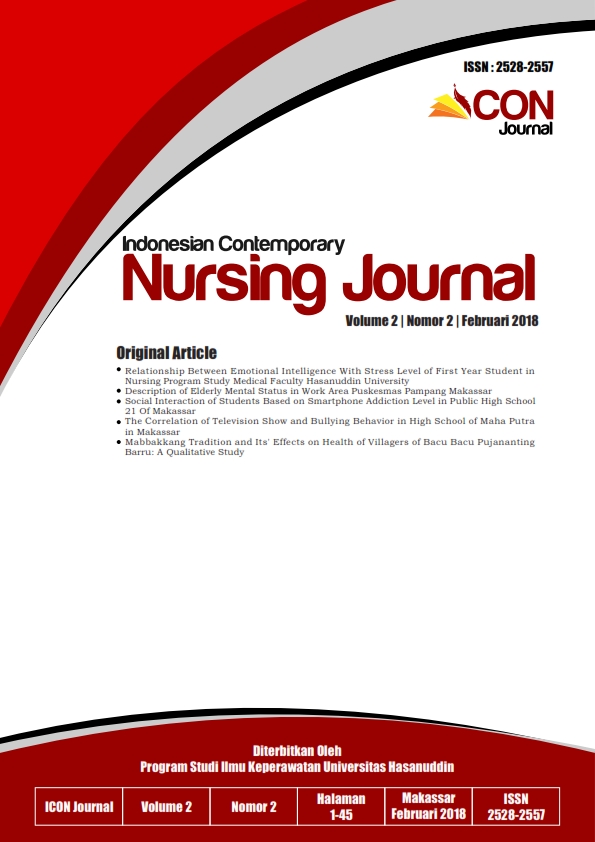Relationship Between Emotional Intelligence With Stress Level of First Year Student in Nursing Program Study Medical Faculty Hasanuddin University
DOI:
https://doi.org/10.20956/icon.v2i2.7675Abstract
Introduction: Stress is a thing that can be experienced by anyone, including first year students. Every person are different in coping with stress, one of the factor is emotional intelligence. This study aimed to investigate the relationship between emotional intelligence and stress level of first year students in Nursing Program Study Medical Faculty Hasanuddin University. Method: The study design was cross sectional approach. This research was conducting by filling the quostionnaire of emotional intelligence and stress, are measured by emotional intelligence adolescent and Depression Anxiety Scale (DASS 42).Result: In this study showed that there is a relationship between emotional intelligence and stress level of first year students, with significant value of p 0.036. Individual with high emotional intelligence, showed the lower stress level. The dimensions of emotional intelligence that may have be contributed to the stress of students are ability to manage emotions and motivation. Conclusions: It is concluded that there is a negative relationship between emotional intelligence and stress level of first year students. Therefore, it is necessary to have a program that can develop emotional intelligence for first year student.
References
Abdollahi, A., Carlbring, P., Khanbani, M., & Ghahfarokhdi, S. A. (2016). Emotional intelligence moderates perceived stress and suicidal ideation among depressed adolescent in patients. Personality and Individual Differences, 102, 223-228.
Andriani, H. (2011). Hubungan motivasi belajar dan prestasi akademik mahasiswa S1 Keperawatan Sekolah Tinggi Ilmu Kesehatan Dian Husada Mojokerto. Jurna Keperawatan, 1(1), 1-10.
Asmadi. (2008). Konsep dasar keperawatan. Jakarta: EGC.
Bataineh, M. Z. (2013). Academic stress among undergraduate students: this case of education faculty at King Saud University. International Interdisciplinary Journal of Education, 2(1), 82-88.
Fadilah, M., & Suleeman, J. (2013). Gambaran kecerdasan emosional mahasiswa Fakultas Psikologi Universitas Indonesia. Depok: Universitas Indonesia.
Forushani, N. Z., & Besharat, M. A. (2011). Relation between emotional intelligence and perceived stress among female students. Procedia Social and Behavioral Sciences, 30, 1109-1112.
Goleman, D. (2015). Emotional intelligence: Kecerdasan emosional. Jakarta: Gramedia Pustaka Utama.
KBBI. (2016). Mahasiswa. Retrieved from Kamus Besar Bahasa Indonesia (KBBI): http://kbbi.web.id/mahasiswa
Learner, R. M., & Steinberg, L. (2009). Handbook of adolescent psychology (3 ed., Vol. 1). Canada: John Wiley & Sons.
Maulana, Z. F., TU, S., F, S., & JMC, S. (2014). Perbedaan tingkat stres antara mahasiswa tahun pertama dan tahun kedua di Fakultas Kedokteran Universitas Lampung. Jurnal Kedokteran Universitas Lampung, 3(4), 154-162.
Mi-Ran, K., & Su-Jeong, H. (2015). Nursing students' emotional intelligence and coping strategies. Advanced Sciences and Technology Letters, 88, 53-56.
Nafiati, D. A. (2015). Lingkungan belajar dan kecerdasan emosional sebagai faktor yang mempengaruhi stres kuliah mahasiswa. Jurnal Penelitian dan Wacana Pendidikan, 9(1), 8-12.
Ninggalih, R. (2013, Juni). Stres, gangguan, psikologis, dan hubungannya dengan kondisi fisik. Retrieved September 22, 2016, from Majalah 1000 guru: http://majalah1000guru.net/2013/06/stres-gangguan-psikologis-fisik/
Nugroho, K. M., Pasiak, T. F., & Tanudjaja, G. N. (2016). Gambaran empati pada mahasiswa Fakultas Kedokteran Universitas Sam Ratulangi angkatan 2012. Jurnal e-Biomedik, 4(1), 1-7.
Nurliyanti. (2014). Pengaruh terapi tawa terhadap tingkat stres mahasiswa semester awal PSIK FK UH. [Skripsi tidak dipublikasikan]. Makassar: Universitas Hasanuddin.
Patil, S. K., Patkar, U. S., & Patkar, K. U. (2016). Comparision of levels of stress in different years of M.B.B.S student in medical college - an observational study. International Journal of Contemporary Medical Research, 3(6), 1655-1657.
Potter, P. A., & Perry, A. G. (2005). Buku ajar fundamental keperawatan: konsep proses dan praktek (4 ed., Vol. 1). Jakarta: EGC.
Prasetiyo, A., & Andriani, I. (2011). Hubungan antara kecerdasan emosi dengan subjective well being pada mahasiswa tingkat pertama. Proceeding PESAT (Psikologi, Ekonomi, Sastra, Arsitektur, & Sipil, 4, 22-26.
Pratama, M. R., & Prihatiningsih, D. (2014). Hubungan motivasi akademik dengan tingkat stres akademik mahasiswa keperawatan semester VI Stikes 'Aisyiyah Yogyakarta. Yogyakarta: Stikes 'Aisyiyah.
Reddy, E. A., Venu, V. G., & Rajana, B. (2015). Perceived stress and prevalence of depression among first-year medical students. Journal of Dr. NTR University of Health Science, 4(4), 209-213.
Santrock, J. W. (2003). Adolescence perkembangan remaja. Jakarta: Erlangga.
Seaward, B. L. (2011). Essentials of managing stress. Jones and Bartlett Publishers.
Sohail, N. (2013). Stress and academic performace among medical students. Journal of the College of Physicians and Surgeons Pakistan, 23(1), 67-71.
Sulistyowati, D. A., Wismanto, Y. B., & Utami, C. T. (2015). Hubungan antara kecerdasan emosional dan optimisme dengan problem focused coping pada mahasiswa S1 Keperawatan Stikes Telogorejo Semarang. Kajian Ilmiah Psikologi, 4(1), 11-18.
Swarjana, I. K. (2012). Metodologi penelitian kesehatan: Tuntunan praktis pembuatan proposal penelitian. Yogyakarta: ANDI.
Tridhonanto, A. (2009). Melejitkan kecerdasan emosi (EQ) buah hati. Jakarta: Elex Media Komputindo.
Yadav, R., Khanna, A., & Singh, D. (2016). Exploration of relationship between stress and spirituality characteristics of male and female engineering students: a comprehensive study. Journal of Religion and Health, 55(6), 1-12.
Yamani, N., Shahabi, M., & Haghani, F. (2014). The relationship between emotional intelligence and job stress in the faculty faculty of medicine in Isafahan University of Medical Sciences. Journal of Advances in Medical Education & Professionalism, 2(1), 20-26.
Zeidner, M., & Onlick-Shemesh, D. (2010). Emotional Intelligence and subjective well-being revisited. Personality and Individual Difference, 48, 431-435.
Downloads
Published
How to Cite
Issue
Section
License
Authors who publish with this journal agree to the following terms:Authors retain copyright and grant the journal right of first publication with the work simultaneously licensed under a Creative Commons Attribution License that allows others to share the work with an acknowledgement of the work's authorship and initial publication in this journal.
Authors are able to enter into separate, additional contractual arrangements for the non-exclusive distribution of the journal's published version of the work (e.g., post it to an institutional repository or publish it in a book), with an acknowledgement of its initial publication in this journal.
Authors are permitted and encouraged to post their work online (e.g., in institutional repositories or on their website) prior to and during the submission process, as it can lead to productive exchanges, as well as earlier and greater citation of published work (See The Effect of Open Access).



